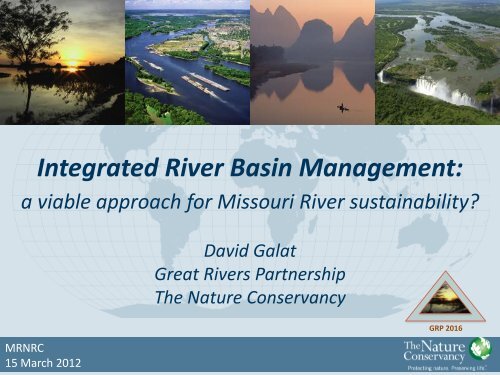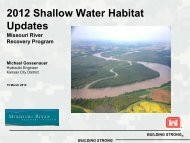Integrated River Basin Management: A Viable Approach for Missouri ...
Integrated River Basin Management: A Viable Approach for Missouri ...
Integrated River Basin Management: A Viable Approach for Missouri ...
You also want an ePaper? Increase the reach of your titles
YUMPU automatically turns print PDFs into web optimized ePapers that Google loves.
MRNRC<br />
15 March 2012<br />
GRP 2016<br />
<strong>Integrated</strong> <strong>River</strong> <strong>Basin</strong> <strong>Management</strong>:<br />
a viable approach <strong>for</strong> <strong>Missouri</strong> <strong>River</strong> sustainability?<br />
David Galat<br />
Great <strong>River</strong>s Partnership<br />
The Nature Conservancy<br />
GRP 2016
<strong>Missouri</strong> <strong>River</strong> Recovery is at a Crossroads<br />
2012<br />
$$<br />
<strong>Missouri</strong> <strong>River</strong> Ecosystem<br />
Restoration Plan (MRERP)<br />
2011<br />
<strong>Missouri</strong> <strong>River</strong> Authorized<br />
Purposes Study (MRAPS)<br />
<strong>Missouri</strong> <strong>River</strong> Association of<br />
States and Tribes (MoRAST)<br />
MO, NE, IA<br />
GRP 2016
<strong>Missouri</strong> <strong>River</strong> Recovery is at a Crossroads<br />
2011<br />
MOR Planning:<br />
Recognizing & Incorporating<br />
Sediment<br />
<strong>Management</strong><br />
WHY?<br />
2011<br />
MRRP<br />
Independent Science Panel<br />
Spring Pulses & Adaptive<br />
<strong>Management</strong><br />
GRP 2016
Issues of Sovereignty & Power<br />
GRP 2016<br />
“For example, in the Delaware [<strong>River</strong> <strong>Basin</strong>] . . . you have<br />
something very special in the US. Decisions are reached<br />
on majority rule, even though the Federal government is a<br />
part of the decision. It took many years in court <strong>for</strong> this<br />
to evolve. The reason is that the federal government<br />
cannot subject itself to majority rule with other<br />
sovereign entities such as States, as that would be a<br />
serious unconstitutional delegation of powers. But a<br />
<strong>for</strong>mula was found.<br />
The failure in the Colorado and <strong>Missouri</strong> rivers has<br />
resulted in a default position of Federal rule through<br />
courts under a judicial review process because of State<br />
stalemate—a horrible way to run a basin.” (J.D. Priscoli,<br />
USACE – WRI, 2007).<br />
Source: Hooper , B. 2010. Water Policy 12: 1-24. <strong>River</strong> basin organization per<strong>for</strong>mance indicators
<strong>Integrated</strong> <strong>River</strong> <strong>Basin</strong> <strong>Management</strong> (IRBM)<br />
GRP 2016<br />
The collaborative process of integrating<br />
conservation, management and development of water,<br />
land and related resources across sectors within a<br />
given river basin, in order to improve the economic<br />
and social benefits derived from water resources in<br />
an equitable manner while preserving and, where<br />
necessary, restoring freshwater ecosystems.<br />
IRBM is a process, not a destination…<br />
Adapted from <strong>Integrated</strong> Water Resources <strong>Management</strong>, Global Water Partnership Technical Advisory Committee Background Papers, No. 4,<br />
2000
Adjust<br />
Two-phase Learning in Adaptive IRBM<br />
Institutional learning<br />
Set-up Phase<br />
• Define issues, assess political climate &<br />
social demands<br />
• Collect data relevant to issues<br />
• Analyze data & refine issues<br />
• Model processes to ID options & actions<br />
• Collaboratively ID management actions<br />
• Test prototype options & actions in field<br />
Iterative Phase<br />
• Audit outcomes, develop learning,<br />
derive best practices<br />
• Apply prototype to other subbasins<br />
• Monitor & evaluate broader<br />
applications<br />
• Refine issues & goals, provide<br />
feedback<br />
Diagram source: Williams et al. 2007. Content source: Hooper 2005<br />
GRP 2016<br />
Assess Problem<br />
Design<br />
Implement<br />
Monitor<br />
Evaluate
Time<br />
‘Spiral’ Model of IRBM<br />
IRBM Process<br />
Adapted from E. Z. Stakhiv 2009. IWRM Guidelines at <strong>River</strong> <strong>Basin</strong> level. World Water Week, Stockholm<br />
GRP 2016
Cross-cutting Principles <strong>for</strong> Effective IRBM<br />
•Integration<br />
•Scale<br />
•Participation<br />
•Capacity<br />
GRP 2016<br />
Adapted from World Wide Fund <strong>for</strong> Nature. 2001: http://www.ocs.polito.it/acque/dwd/gestione/good_practice_rbm.pdf
Cross-cutting Principles <strong>for</strong> Effective IRBM<br />
INTEGRATION<br />
• Among bodies directly involved with<br />
water management<br />
GRP 2016<br />
• Between water managers & other sectors<br />
• Plan & manage on hydrological<br />
boundaries<br />
• Linkages between the watershed & its<br />
rivers & within rivers<br />
Adapted from World Wide Fund <strong>for</strong> Nature. 2001: http://www.ocs.polito.it/acque/dwd/gestione/good_practice_rbm.pdf
Cross-cutting Principles <strong>for</strong> Effective IRBM<br />
SCALE<br />
• Large variation in sub-basins means<br />
approaches suitable <strong>for</strong> one location are<br />
GRP 2016<br />
not automatically transferable elsewhere<br />
• Need to coordinate ‘top-down’ &<br />
‘bottom-up’ approaches so actions at<br />
local scale are coordinated to achieve<br />
‘good status’ at basin scale<br />
Adapted from World Wide Fund <strong>for</strong> Nature. 2001: http://www.ocs.polito.it/acque/dwd/gestione/good_practice_rbm.pdf
Cross-cutting Principles <strong>for</strong> Effective IRBM<br />
TIMING<br />
• Some objectives & ‘good practice’<br />
approaches require immediate action<br />
• Use existing structure, processes & tools<br />
wherever possible − IF they can deliver<br />
targeted outcomes<br />
• <strong>Management</strong> actions should not be<br />
delayed until all possible planning &<br />
monitoring has been completed<br />
GRP 2016<br />
Adapted from World Wide Fund <strong>for</strong> Nature. 2001: http://www.ocs.polito.it/acque/dwd/gestione/good_practice_rbm.pdf
Cross-cutting Principles <strong>for</strong> Effective IRBM<br />
TIMING, continued<br />
• Strategies <strong>for</strong> stakeholder involvement<br />
are developed & implemented from the<br />
beginning – different groups engaged at<br />
different stages<br />
• Timing of related initiatives may impact<br />
GRP 2016<br />
timetable <strong>for</strong> achieving primary objectives<br />
– if links not considered at early stage<br />
Adapted from World Wide Fund <strong>for</strong> Nature. 2001: http://www.ocs.polito.it/acque/dwd/gestione/good_practice_rbm.pdf
Cross-cutting Principles <strong>for</strong> Effective IRBM<br />
PARTICIPATION<br />
• Included in all planning & management<br />
from the beginning<br />
• Adapted to appropriate scale & target<br />
groups<br />
• Managed carefully so capacity to meet<br />
commitments is not exceeded<br />
GRP 2016<br />
Adapted from World Wide Fund <strong>for</strong> Nature. 2001: http://www.ocs.polito.it/acque/dwd/gestione/good_practice_rbm.pdf
Cross-cutting Principles <strong>for</strong> Effective IRBM<br />
PARTICIPATION, continued<br />
• Supported by adequate human &<br />
financial resources<br />
• For interjurisdictional rivers – ensure<br />
GRP 2016<br />
public and stakeholder participation from<br />
all states & tribes<br />
Adapted from World Wide Fund <strong>for</strong> Nature. 2001: http://www.ocs.polito.it/acque/dwd/gestione/good_practice_rbm.pdf
Cross-cutting Principles <strong>for</strong> Effective IRBM<br />
CAPACITY<br />
GRP 2016<br />
• Need to build capacity among economic &<br />
social sectors as well as among officials,<br />
planners & administrators<br />
• Special needs of Native American<br />
interests<br />
Adapted from World Wide Fund <strong>for</strong> Nature. 2001: http://www.ocs.polito.it/acque/dwd/gestione/good_practice_rbm.pdf
Cross-cutting Principles <strong>for</strong> Effective IRBM<br />
CAPACITY, continued<br />
• Enhance sharing of in<strong>for</strong>mation &<br />
experience among states, Tribes, sub-<br />
basins & sectors (Internet)<br />
• Allocate adequate human & financial<br />
resources <strong>for</strong> capacity building in each<br />
sub-basin<br />
GRP 2016<br />
Adapted from World Wide Fund <strong>for</strong> Nature. 2001: http://www.ocs.polito.it/acque/dwd/gestione/good_practice_rbm.pdf
Organizations Implementing Aspects of IRBM<br />
Frasier <strong>Basin</strong><br />
Council<br />
Grand R.<br />
Cons. Auth.<br />
Red R.<br />
<strong>Basin</strong> Comm.<br />
Delaware R.<br />
<strong>Basin</strong> Comm.<br />
Interstate Comm.<br />
on Potomac R. <strong>Basin</strong><br />
La Plata Intergov.<br />
Coord. Com.<br />
Int. Comm.<br />
Protection Rhine<br />
Danube R.<br />
Comm.<br />
Int. Comm. Congo-<br />
Oubangui-Sangha <strong>Basin</strong><br />
Okavango <strong>River</strong> <strong>Basin</strong><br />
Water Comm.<br />
Orange-Senqu R.<br />
Comm.<br />
Mekong R.<br />
Comm.<br />
Murray-Darling<br />
<strong>Basin</strong> Authority<br />
GRP 2016
America’s Great Watershed Initiative (AGWI)<br />
GRP 2016<br />
Success & innovation<br />
in meeting the<br />
multiple demands<br />
we place on this vast<br />
& complex system<br />
require integration of<br />
issues, partners,<br />
ideas & solutions at<br />
the full watershed<br />
scale.
Steering Committee<br />
Stephen Gambrell<br />
Mississippi <strong>River</strong> Commission,<br />
U.S. Army Corps of Engineers<br />
Teri Goodmann<br />
National Mississippi <strong>River</strong><br />
Museum & Aquarium<br />
George Grugett<br />
Mississippi Valley Flood<br />
Control Association<br />
Steve Mathies<br />
Cardno Emerging Markets,<br />
Lower Mississippi <strong>River</strong> <strong>Basin</strong><br />
Daniel Mecklenborg<br />
Ingram Barge Co.<br />
Barb Naramore<br />
Upper Mississippi <strong>River</strong> <strong>Basin</strong><br />
Association<br />
Michael Reuter<br />
Great <strong>River</strong>s Partnership,<br />
The Nature Conservancy<br />
Rainy Shorey<br />
Caterpillar Inc.<br />
Roger Wolf<br />
Iowa Soybean Association<br />
AGWI Goals<br />
GRP 2016<br />
• Build and implement a vision<br />
based on collaboration and<br />
mutually beneficial outcomes in<br />
contrast to single-purpose<br />
advocacy.<br />
• Build upon strong leadership<br />
present in many tributary<br />
watersheds.<br />
• Link and augment these ef<strong>for</strong>ts,<br />
creating a broader partnership<br />
that can serve as a unified voice<br />
<strong>for</strong> the whole system, and support<br />
the effective resolution of issues<br />
that span multiple regions.
A Unique Gathering<br />
117 Participants<br />
―76 Organizations<br />
―20 States<br />
Work Groups<br />
―Vision<br />
―Stakeholders<br />
―Communications<br />
―Science<br />
―Projects<br />
America’s Inner Coast Summit<br />
Focus on Sustainability and Collaboration<br />
―Navigation, Flood Control, Cultural and Social<br />
Resources, Environment<br />
More Info: http://www.conference.ifas.ufl.edu/AICS/<br />
GRP 2016<br />
Major General Michael Walsh<br />
Next Summit:<br />
Late 2012
Take-home Points<br />
<strong>Integrated</strong> <strong>River</strong> <strong>Basin</strong> <strong>Management</strong>:<br />
a viable approach <strong>for</strong> <strong>Missouri</strong> <strong>River</strong> sustainability?<br />
• A basin-wide approach<br />
• All sectors represented<br />
GRP 2016<br />
• Private, public & NGO sectors lead (RBO)<br />
− government agencies participate<br />
• <strong>River</strong> <strong>Basin</strong> Plan guides process<br />
• MRRIC can provide impetus
Benefits of <strong>Integrated</strong> <strong>River</strong> <strong>Basin</strong> <strong>Management</strong><br />
GRP 2016<br />
IRBM Effectively Delivers a Triple Bottom Line<br />
Essential <strong>for</strong> Sustainable Development<br />
Economic<br />
Efficiency<br />
Sustainable<br />
Development<br />
Social<br />
Equity<br />
Environmental<br />
Resilience
The Future? AGWI Meeting, 19 January 2011<br />
GRP 2016<br />
‘People hate politics and politicians. There is<br />
authenticity by having people coming together because<br />
they care about the future of businesses, regions,<br />
watersheds… Why seek permission from them to do<br />
what you intend to do? There’s nothing stopping you.<br />
You have your own energy and networks. You can come<br />
together quickly around economic development etc. that<br />
arises from within the watershed - not by asking <strong>for</strong><br />
permission… It will be so much easier to<br />
come up with your public value story<br />
without government intervention.’<br />
David Wilhelm, chair of the Democratic National<br />
Committee in the 1990s, now an entrepreneur and<br />
impact investor devoted to building sustainable jobs<br />
and wealth in small town America.




